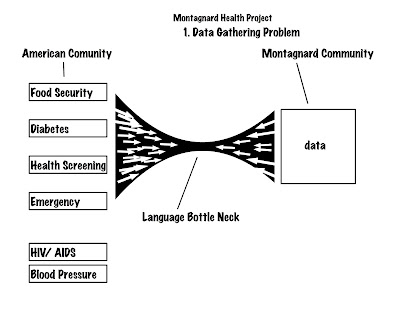(Refugee and Diversity Projects) >Health > (Overview: Refugee Community Health Team) > Collaborative Process: Refugee Community Health Team
A COLLABORATIVE PROCESS BUILT ON MUTUAL INTERESTS
December 2010. Khin H and Kwol Ksa wear their UNCG badges identifying them as community health workers and carry their university bags for the first time.
December 2010. Khin H and Kwol Ksa wear their UNCG badges identifying them as community health workers and carry their university bags for the first time.
These graphics were used to explain how multiple resources and interests could come together to make permanent inroads into the Montagnard community for the purposes of data collection, information exchange, and improved community health. In November 2010, I got the go-ahead from UNCG's Dr. Jigna Dharod and Project Shine's Mandy Benson to proceed with training.
1. Data Gathering Problem. For the American side to collect data required it to overcome the longstanding bottleneck created by difficult language and cultural problems.
2. Create a Community Health Team. I proposed that a health team created specifically to address language problems could help increase the flow of data from the Montagnard to the American community. Only through a team approach could we cover all the languages and cultural nuances represented in the Montagnard community. I further proposed that women with the time and motivation could be trained to conduct health interviews. The costs of their training would be offset by the value of the data they could gather and the permanent inroads they could create.
3. Long Term Capacity Building. Over time, as the team's education and experience grew, it would open the bottleneck and facilitate more exchanges.
4. Stakeholders in the Community Health Team. For the first time, we could figure out how overlapping interests could help fund and get started the organization and training of a health team.
5. Time Line. The health team will aid in the completion of specific data-gathering surveys as well as help with general health information and health literacy training in the community.






